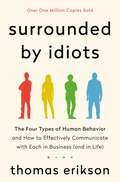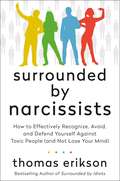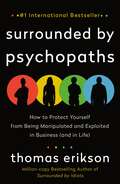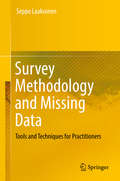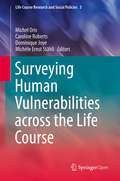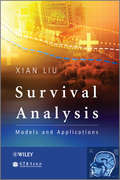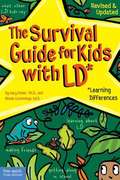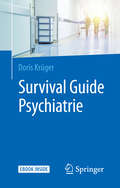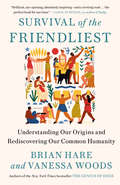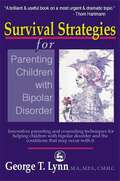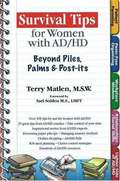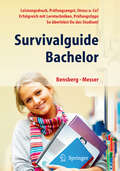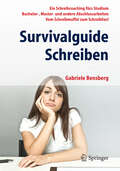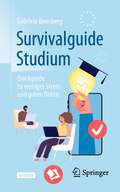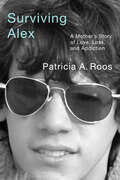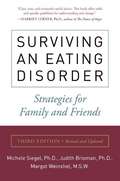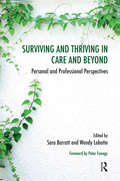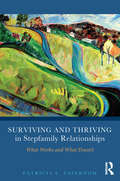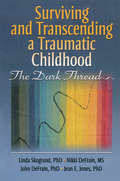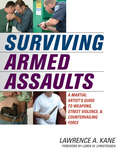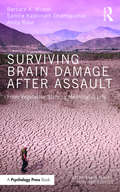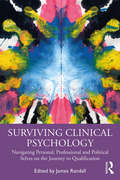- Table View
- List View
Surrounded by Idiots: The Four Types of Human Behavior and How to Effectively Communicate with Each in Business (and in Life) (The Surrounded by Idiots Series)
by Thomas EriksonDo you ever think you’re the only one making any sense? Or tried to reason with your partner with disastrous results? Do long, rambling answers drive you crazy? Or does your colleague’s abrasive manner rub you the wrong way? You are not alone. After a disastrous meeting with a highly successful entrepreneur, who was genuinely convinced he was ‘surrounded by idiots’, communication expert and bestselling author, Thomas Erikson dedicated himself to understanding how people function and why we often struggle to connect with certain types of people. Surrounded by Idiots is an international phenomenon, selling over 1.5 million copies worldwide. It offers a simple, yet ground-breaking method for assessing the personalities of people we communicate with – in and out of the office – based on four personality types (Red, Blue, Green and Yellow), and provides insights into how we can adjust the way we speak and share information. Erikson will help you understand yourself better, hone communication and social skills, handle conflict with confidence, improve dynamics with your boss and team, and get the best out of the people you deal with and manage. He also shares simple tricks on body language, improving written communication, advice on when to back away or when to push on, and when to speak up or shut up. Packed with ‘aha!’ and ‘oh no!’ moments, Surrounded by Idiots will help you understand and communicate with those around you, even people you currently think are beyond all comprehension. And with a bit of luck you can also be confident that the idiot out there isn’t you!
Surrounded by Narcissists: How to Effectively Recognize, Avoid, and Defend Yourself Against Toxic People (and Not Lose Your Mind) [The Surrounded by Idiots Series] (The Surrounded by Idiots Series)
by Thomas EriksonPart of the bestselling Surrounded by Idiots series!Internationally bestselling author Thomas Erikson shares the secrets of dealing with everyday narcissists.Are the narcissists in your life making you miserable? Are you worn out by their constant demands for attention, their absolute conviction they are right (even when they’re clearly not), their determination to do whatever they want (regardless of the impact), and their baffling need to control everyone and everything around them?In this thought-provoking, sanity-saving book, Thomas Erikson helps you understand what makes narcissists tick and, crucially, how to handle them without wearing yourself out in the process. With the help of the simple, four-color behavioral model made famous in Surrounded by Idiots, Erikson provides all the tools you need to manage not just the narcissists around you but everyday narcissistic behaviors as well–something that is becoming more widespread in the age of social media. Engaging and practical, Surrounded by Narcissists will help you free yourself from the thrall of others' toxic agendas so you can pursue a happier, more fulfilling and successful life.
Surrounded by Psychopaths: How to Protect Yourself from Being Manipulated and Exploited in Business (and in Life) (The Surrounded by Idiots Series)
by Thomas Erikson#1 internationally bestselling author Thomas Erikson shows readers how to identify and avoid the psychopaths around them.Charming, charismatic, and delightful or manipulative, self-serving, and cunning? Psychopaths are both and that’s exactly what makes them dangerous. Bestselling author of the international phenomenon Surrounded by Idiots, Thomas Erikson reveals how to identify the psychopaths in your life and combat their efforts to control and manipulate. Using the same simple four-color system of behavior classification that made Surrounded by Idiots so popular, Surrounded by Psychopaths teaches readers how to deal with psychopaths in their lives by becoming aware of their own behavior and their weaknesses. Vivid example stories illustrate ways that psychopaths can take advantage of various behavior types, helping readers identify their own weaknesses and be proactive about protecting themselves. Erikson outlines some of the most common forms of manipulation used by psychopaths—and others—to influence those around them. Since manipulation can often be a feature of ordinary, non-psychopathic relationships, the book also includes practical methods and techniques to help readers confront controlling people and rehabilitate negative relationships into mutually respectful ones. By understanding your behavior as well as the tendencies and strategies of psychopaths, Surrounded by Psychopaths will teach you to protect yourself from manipulative influence in your workplace, social life, and family.
Survey Methodology and Missing Data: Tools and Techniques for Practitioners
by Seppo LaaksonenThis book focuses on quantitative survey methodology, data collection and cleaning methods. Providing starting tools for using and analyzing a file once a survey has been conducted, it addresses fields as diverse as advanced weighting, editing, and imputation, which are not well-covered in corresponding survey books. Moreover, it presents numerous empirical examples from the author's extensive research experience, particularly real data sets from multinational surveys.
Surveying Human Vulnerabilities across the Life Course (Life Course Research And Social Policies Ser. #3)
by Caroline Roberts Michel Oris Dominique Joye Michèle Ernst StähliThis volume details tools and procedures for data collections of hard-to-reach, hard-to-survey populations. Inside, readers will discover first-hand insights from experts who share their successes as well as their failures in their attempts to identify and measure human vulnerabilities across the life course. Coverage first provides an introduction on studying vulnerabilities based on the Total Error Survey framework. Next, the authors present concrete examples on how to survey such populations as the elderly, migrants, widows and widowers, couples facing breast cancer, employees and job seekers, displaced workers, and teenagers during their transition to adulthood. In addition, one essay discusses the rationale for the use of life history calendars in studying social and psychological vulnerability while another records the difficulty the authors faced when trying to set-up an online social network to collect relevant data. Overall, this book demonstrates the importance to have, from the very beginning, a dialogue between specialists of survey methods and the researchers working on social dynamics across the life span. It will serve as an indispensable resource for social scientists interested in gathering and analyzing data on vulnerable individuals and populations in order to construct longitudinal data bases and properly target social policies.
Survival Analysis
by Xian LiuSurvival analysis concerns sequential occurrences of events governed by probabilistic laws. Recent decades have witnessed many applications of survival analysis in various disciplines. This book introduces both classic survival models and theories along with newly developed techniques. Readers will learn how to perform analysis of survival data by following numerous empirical illustrations in SAS.Survival Analysis: Models and Applications: Presents basic techniques before leading onto some of the most advanced topics in survival analysis.Assumes only a minimal knowledge of SAS whilst enabling more experienced users to learn new techniques of data input and manipulation.Provides numerous examples of SAS code to illustrate each of the methods, along with step-by-step instructions to perform each technique.Highlights the strengths and limitations of each technique covered.Covering a wide scope of survival techniques and methods, from the introductory to the advanced, this book can be used as a useful reference book for planners, researchers, and professors who are working in settings involving various lifetime events. Scientists interested in survival analysis should find it a useful guidebook for the incorporation of survival data and methods into their projects.
The Survival Guide for Kids with LD*: *Learning Differences
by Gary L. Fisher Rhoda CummingsThis book discusses how children with learning differences can get along better in school, set goals, and plan for the future. With references and index.
Survival Guide Psychiatrie
by Doris KrügerDas Buch führt praxisorientiert und konsequent den Assistenzart durch die Hindernisse im ersten Jahr der Psychiatrie. Es beantwortet zahlreiche organisatorische Fragen und ist der Rote Faden, der Anfängern zu Beginn ihrer Berufszeit die Unsicherheit nehmen soll.
Survival of the Friendliest: Understanding Our Origins and Rediscovering Our Common Humanity
by Brian Hare Vanessa WoodsA powerful new theory of human nature suggests that our secret to success as a species is our unique friendliness&“Brilliant, eye-opening, and absolutely inspiring—and a riveting read. Hare and Woods have written the perfect book for our time.&”—Cass R. Sunstein, author of How Change Happens and co-author of Nudge For most of the approximately 300,000 years that Homo sapiens have existed, we have shared the planet with at least four other types of humans. All of these were smart, strong, and inventive. But around 50,000 years ago, Homo sapiens made a cognitive leap that gave us an edge over other species. What happened? Since Charles Darwin wrote about &“evolutionary fitness,&” the idea of fitness has been confused with physical strength, tactical brilliance, and aggression. In fact, what made us evolutionarily fit was a remarkable kind of friendliness, a virtuosic ability to coordinate and communicate with others that allowed us to achieve all the cultural and technical marvels in human history. Advancing what they call the &“self-domestication theory,&” Brian Hare, professor in the department of evolutionary anthropology and the Center for Cognitive Neuroscience at Duke University and his wife, Vanessa Woods, a research scientist and award-winning journalist, shed light on the mysterious leap in human cognition that allowed Homo sapiens to thrive. But this gift for friendliness came at a cost. Just as a mother bear is most dangerous around her cubs, we are at our most dangerous when someone we love is threatened by an &“outsider.&” The threatening outsider is demoted to sub-human, fair game for our worst instincts. Hare&’s groundbreaking research, developed in close coordination with Richard Wrangham and Michael Tomasello, giants in the field of cognitive evolution, reveals that the same traits that make us the most tolerant species on the planet also make us the cruelest. Survival of the Friendliest offers us a new way to look at our cultural as well as cognitive evolution and sends a clear message: In order to survive and even to flourish, we need to expand our definition of who belongs.
Survival Strategies for Parenting Children with Bipolar Disorder: Innovative Parenting and Counseling Techniques for Helping Children with Bipolar Disorder and the Conditions That May Occur With It
by George Lynn'A definitve guide covering all aspects of Bipolar in children, from spotting the symptoms to getting the correct interventions to help cope with the condition. This book explains the Biological causes and helps to seperate the symptoms from those of other conditions including, Tourettes, Aspergers and ADHD, whilst acknowledging that the conditions can appear as co-morbid in some children. Full of practical help and support George Lynn discusses various case histories and how to cope as a parent, along with a guide to help the child learn strategies to live with Bipolar.' - adders.org 'The author, George Lynn, is a certified medical health counselor who has pioneered the usage of psychotherapy for adults and children with neuropsychological issues. When his own son was diagnosed with Tourette syndrome in 1991, he realized that personality can be powerfully impacted by brain chemistry independent of environment...The book is orientated for parents, but I believe many professionals can find helpful tips and information.' - International Journal of Adolescent Medical Health 'George T. Lynn's book, Survival Strategies for Parenting Children with Bipolar Disorder is a valuable resource for parents and those in the mental health profession. The author draws on his experience as a counselor to describe the symptoms of Bipolar Disorder and Bipolar Disorder co-existing with Asperger's Syndrome, Tourette's Disorder or ADHD. He provides a clear, comprehensive perspective on effectively parenting a child with bipolar disorder. He also explains what characteristics the disorders have in common and how they differ from each other. Lynn is skilled at developing the differential diagnosis of disorders that often have significant overlapping characteristics. In every chapter Lynn provides a comprehensive case history, parent survival strategies and simple, straightforward tips for 'surviving meltdowns.' He includes a section on brain physiology, medication management and school success. He gives practical advice about difficult decisions that parents often have to make, including when to call the police and the pros and cons of psychiatric hospitalization. With this book, George Lynn has made a major contribution in the area of parenting children with Bipolar Disorder. He successfully instructs the reader on how to understand and identify the symptoms of these disorders and at the same time how to focus on the child's strengths or "gifts". He delivers a well written and interesting book that provides realistic solutions to difficult problems, and hope to families of these exceptional children.' - Metapsychology Online Review Up until five years ago, the professional community did not think that Bipolar Disorder occurred in children. Children with symptoms of Bipolar Disorder were diagnosed as 'severe ADHD', 'depressed' or 'Oppositional Defiant'. Now, as it is being increasingly diagnosed, George Lynn offers clear, practical advice on recognizing the symptoms, understanding medication and accessing the necessary support at school as well as the managing the day-to-day challenges of parenting a child with Bipolar Disorder. As it is frequently found in combination with ADHD, Tourette Syndrome and Asperger's Syndrome, the author draws on case-studies from his own psychotherapeutic practice to show what these conditions have in common, how they differ, and how they relate to each other. Survival Strategies for Parenting Children with Bipolar Disorder, tackles the most difficult decisions parents can face, including whether to involve police or consider hospitalization if their children are a danger to themselves and their families. At the same time, it emphasizes the positive qualities these children often have and illustrates how their gifts and abilities can build their self-esteem and help them function better in society. However severe the child's symptoms, George Lynn's book will provide guidance, support and inspiration for parents and carers as well as being a useful resource for professionals working with the families who ...
Survival Tips For Women With AD/HD: Beyond Piles, Palms And Post-its
by Terry MatlenWomen with AD/HD tormented by the daily chores and decisions needed to survive in a world of linear thinking will find solace in this self-help guide. Practical tips provide help in dealing with organizational tasks, including paperwork in the home and office, preparing meals, social situations, paying bills on time, household chores, shopping, and personal and family health.
Survival to Self-Care - How to say NO to generational bad habits and YES to the real you
by Karen QueSurvival to Self-Care: How to say NO to generational bad habits and YES to the real you is a story based self-help book which brings to light generational cycles and presents a seven-step process to stop passing them on to future generations. Karen Que explores how life has a way of piling on unfulfilled expectations. These help to build up varying levels of emotional armor, requiring new skills for survival. At the height of her career, feeling buried in pain at her lowest moment, she dug her way out by discovering how to identify, unpack, and release cycles which were handed down through the generations. Each purchase of Survival to Self-Care comes with a special BONUS Companion E-Journal featuring 20 pages to help you accelerate your transformation with exercises and additional tools for better self-care.
Survivalguide Bachelor. Leistungsdruck, Prüfungsangst, Stress und Co? Erfolgreich mit Lerntechniken, Prüfungstipps ... so überlebst Du das Studium
by Jürgen Messer Gabriele BensbergDurch das Bachelor-Studium hat sich das Studieren verändert. Häufige Prüfungen und überfrachtete Studienpläne setzen Studierende unter Druck, die Prüfungsangst nimmt zu. Die Autoren leiten eine Beratungsstelle des Studentenwerks, sie kennen diese Nöte. In ihrem Ratgeber zeigen sie auf einfühlsame und humorvolle Weise, wie sich Studierende physisch und psychisch stärken können: durch Bewegung, Entspannungstechniken und Genuss. Sie vermitteln Strategien für effektives Lernen, für das Stressmanagement sowie Hilfen zur Bewältigung der Prüfungsangst.
Survivalguide Schreiben: Ein Schreibcoaching fürs Studium Bachelor-, Master- und andere Abschlussarbeiten Vom Schreibmuffel zum Schreibfan!
by Gabriele BensbergWenn Studierenden das Schreiben wissenschaftlicher Texte schwer fällt, kann es für sie zum Fluch werden - bis hin zur Angst, an der Abschlussarbeit zu scheitern. Die Autorin, erfahrene Studierenden-Beraterin und Schreibcoach, zeigt in diesem Buch, wie Studierende aufbauend auf ihren alltäglichen Schreibaktivitäten im Internet eine Brücke zum wissenschaftlichen Schreiben schlagen können. Das Buch bietet Handlungsanleitungen und Problemlösungen für alle Phasen der wissenschaftlichen Arbeit und dient darüber hinaus als psychologischer Begleiter.
Survivalguide Studium: Quickguide zu weniger Stress und guten Noten
by Gabriele BensbergStudieren hat es in sich heutzutage - nicht erst seit Beginn der Corona-Pandemie! Doch hier kommt ein kleines Buch, das Dir auf wenigen Seiten den Weg durch den Studi-Alltagsdschungel zeigt. Es gibt viele handliche Tipps rund um Themen wie Arbeitsplatz, Zeitmanagement, Lernmethoden, Möglichkeiten, die Gedächtnisleistung zu steigern sowie die Vorbereitung von Prüfungen und das Schreiben wissenschaftlicher Arbeiten. - Du leidest unter Prüfungsangst oder Schreibblockaden? Lass Dich nicht entmutigen - denn auch das ist lösbar, dieser Ratgeber sagt Dir, wie! Und nicht zuletzt hat er noch hilfreiche Tipps parat, wie Du ganz allgemein eine individuelle Lebensvision entwickelst, Dir Ziele setzt und Selbstvertrauen gewinnst, um Deinen eigenen Weg zu finden und diesen auch bei Widerständen zu gehen - denn wer sich über all dies im Klaren ist, den werfen die Probleme des Studienalltags auch nicht so schnell aus der Bahn. Kurz: Dies ist Dein Guide für den tollen Lebensabschnitt, der sich Studium nennt!
Surviving 9/11: Impact and Experiences of Occupational Therapy Practitioners
by Pat PrecinThe first in-depth look of the effects of September 11 on occupational therapy! Surviving 9/11: Impact and Experiences of Occupational Therapy Practitioners is a collection of firsthand accounts from occupational therapy providers and their clients. This book reveals the thoughts and fears of occupational therapists who had to help heal their patients while suffering emotional and psychological stress themselves. This volume shows how occupational therapy practitioners dealt with the aftermath using group discussions, planned events, and creative projects to heal themselves as well as their clients. Surviving 9/11 demonstrates the importance of therapeutic treatment for all types of victims of the attacks, from survivors to television observers. It discusses how distinct each client&’s needs are-from the survivor in the hospital bed to the firefighter endlessly searching for his lost brothers. This book will also show you the importance of changing therapeutic styles during the lengthy coping process to adapt to the changing needs of the client. This enlightening text is divided into three parts: September 11th Day One-personal and professional accounts of the day of the disaster from occupational therapists in and around the city and around the world-with a special narrative from a 9/11 survivor who received occupational therapy Ground Zero Milieu-the experiences in and around Ground Zero following the attack, including occupational therapists at the rescue and recovery site, the Federal Emergency Management Agency&’s (FEMA) Project Liberty program, and the development of the Downtown Therapists Assistance Project to help occupational and physical therapists whose businesses were irrecoverable after September 11 Spirituality-the new challenges to occupational therapy in mental health in dealing with post-traumatic stress disorder and panic disorder-throughout the general population and in the mental health community Surviving 9/11 is a unique blend of personal and professional perspectives designed to help you get in touch with your feelings and thoughts about what happened on September 11. More importantly, this easy-to-read book can help you prepare for future disasters, whether you are a healthcare professional, a disabled person, a survivor, or someone who is otherwise affected. With illustrations, memorial designs, and photos of the tragedy and its aftermath, this book is a must-read in this age of uncertainty.
Surviving Alex: A Mother’s Story of Love, Loss, and Addiction
by Patricia A. RoosIn 2015, Patricia Roos’s twenty-five-year-old son Alex died of a heroin overdose. Turning her grief into action, Roos, a professor of sociology at Rutgers University, began to research the social factors and institutional failures that contributed to his death. Surviving Alex tells her moving story—and outlines the possibilities of a more compassionate and effective approach to addiction treatment. Weaving together a personal narrative and a sociological perspective, Surviving Alex movingly describes how even children from “good families” fall prey to addiction, and recounts the hellish toll it takes on families. Drawing from interviews with Alex’s friends, family members, therapists, teachers, and police officers—as well as files from his stays in hospitals, rehab facilities, and jails—Roos paints a compelling portrait of a young man whose life veered between happiness, anxiety, success, and despair. And as she explores how a punitive system failed her son, she calls for a community of action that would improve care for substance users and reduce addiction, realigning public health policy to address the overdose crisis.
Surviving an Eating Disorder: New Perspectives and Strategies for Family and Friends
by Michele Siegel Margot Weinshel Judith BrismanFrom the book: The first book of its kind, Surviving an Eating Disorder is an inspiring yet realistic guide written expressly for parents, spouses, friends, relatives, and all others who are the "silent sufferers" of anorexia, bulimia, and compulsive overeating. Whether you've just begun to suspect a problem or have been facing the frightening reality of a serious disorder for some time, this reassuring book will help you to overcome feelings of confusion, helplessness, and anger and to take new actions that will encourage the recovery process. The authors, three leading experts in the field, explain what you can expect from the eating-disordered person--and yourself---and what kind of support is available. Drawing on the authors' extensive experience in counseling individuals, groups, and families, and illustrated throughout with vivid case examples, Surviving an Eating Disorder will help answer all your questions, large and small: Why is this happening? Can I keep sweets in the house? What do I say when she asks if she looks fat? How can I help him with his diet? Should I suggest therapy? Will things get better? In Part I, "Gaining Perspective," the authors discuss the psychological components of eating disorders as well as the family contexts in which they develop. Part II, "Confronting the Problem," offers guidance for bringing the problem out into the open, getting the person into treatment, and coping with the possibility of anger and denial. In Part III, "Using New Strategies," the authors show how the situation can be made better--now--by disengaging from the eating disorder (with practical suggestions for handling such daily issues as mealtimes, messy bathrooms, money, and requests for advice) while reestablishing a relationship with the eating disordered person based on issues other than food and weight. The guide concludes with names and addresses of national organizations and a list of suggested readings.
Surviving an Eating Disorder, Third Edition
by Judith Brisman Margot Weinshel Michele SiegelSurviving an Eating Disorder has become a classic since it was first published in 1988. It was one of the first books to offer effective support and solutions for family, friends, and all others who are the "silent sufferers" of eating disorders. This updated and revised edition provides the latest information on how parents, spouses, friends, and professionals can thoughtfully determine the right course of action in their individual situations. With its combination of information, insight, case examples, and practical strategies, Surviving an Eating Disorder opens the way to new growth and helpful solutions in your relationship with your loved one.
Surviving and Thriving in Care and Beyond: Personal and Professional Perspectives (The Systemic Thinking and Practice Series)
by Sara BarrattThis is a book about children who have to grow up apart from their biological parents, the impact of this on their lives and on those who look after them, and how we can respond to the challenges this poses in order that they can grow and develop in healthy directions. It provides a systemic framework to describe working with children and adults who are or have been in care or adopted, as well as working with their adoptive parents and carers, highlighting their own narratives and those of professionals working with them. The authors have tried to make space for multiple voices to speak and describe aspects of the care system and life beyond. There are contributions from those who have been brought up away from their biological parents, their adoptive parents and foster or kinship carers. There are also contributions from researchers and professionals with expertise in working with children in substitute care, who describe their theoretical and clinical approaches, privileging the voices of those with whom they work.
Surviving and Thriving in Stepfamily Relationships: What Works and What Doesn't
by Patricia L. PapernowSurviving and Thriving in Stepfamily Relationships draws on current research, a wide variety of clinical modalities, and thirty years of clinical work with stepfamily members to describe the special challenges stepfamilies face. The book presents the concept of "stepfamily architecture" and the five challenges it creates, and delineates three different levels of strategies—psychoeducation, building interpersonal skills, and intrapsychic work—for meeting those challenges in dozens of different settings. The model is designed to be useful both to stepfamily members themselves and to a wide variety of practitioners, from a highly trained clinician who needs to know how and when to work on all three levels, to a school counselor or clergy person who may work on the first two levels but refer out for level three. It will also be useful to educators, judges, mediators, lawyers and medical personnel who will practice on the first level, but need to understand the other two to guide their work.
Surviving and Transcending a Traumatic Childhood: The Dark Thread
by Linda Skogrand Jean Jones John DeFrain Nikki DeFrainA powerful guide to transcending childhood trauma—from the people who’ve done itIt’s like a dark thread woven through a piece of cloth: You can’t pull it out without unraveling the whole thing. And it shows up here and there among all the other threads.Surviving and Transcending a Traumatic Childhood: The Dark Thread weaves together 90 stories of survival to create a silver lining of hope for those struggling to heal from childhood trauma. This unique book documents the endless challenges facing children and adults who have been subjected to physical, emotional, and psychological abuse, and examines the proactive coping strategies that have made their recoveries a success. Each poignant story reveals an amazing capacity for growth and an ability to adapt emotionally that offers a positive spirit to others suffering abuse.Surviving and Transcending a Traumatic Childhood: The Dark Thread examines how 90 people who have experienced childhood trauma and abuse have been able to rise above the suffering to not only endure, but prevail. In their own words, trauma survivors discuss what happened to them as children and the process they went through to become healthy, happy adults. Their stories are heartfelt, heartbreaking, and sometimes surprising in the variety of traumatic experiences, the intensity of the stress, and the number of people who were forced to deal with multiple issues in childhood, including sexual and physical abuse, alcoholism, neglect, and violence. The stories told in Surviving and Transcending a Traumatic Childhood: The Dark Thread explore: when the trauma began common feelings associated with trauma therapy and support groups getting married escaping abuse the role of religion and spirituality significant people who provided help types of homes where abuse occurred the positive effects of surviving trauma school life patterns of survival and much moreSurviving and Transcending a Traumatic Childhood: The Dark Thread also includes a list of resources that might be helpful to those in the process of transcending trauma and a self-study guide for developing a deeper understanding of the healing process.
Surviving Armed Assaults: A Martial Artists Guide to Weapons, Street Violence, and Countervailing Force
by Lawrence A. KaneFair Fight? Not likely. Least of all from a criminal who is looking to make a quick profit at your expense. A sad fact is that weapon-wielding thugs victimize 1,773,000 citizens every year in the United States alone. Even martial artists are not immune from this deadly threat. Consequently, self-defense training that does not consider the very real possibility of an armed attack is dangerously incomplete. Whether you live in the city or countryside, you should be both mentally and physically prepared to deal with an unprovoked armed assault at any time. Preparation must be comprehensive enough to account for the plethora of pointy objects, blunt instruments, explosive devices, and deadly projectiles that someday could be used against you. This extensive book teaches proven survival skills that can keep you safe on the street. A multitude of real-life scenarios and case studies analyzing violent encounters will help you to internalize this crucial knowledge. Contents include: * Awareness * Avoidance * De-escalation * Countervailing force * Armed conflict * Managing the aftermath of violence * Weapon features and functions If you are serious about self-defense this book is for you. Everyone, including experienced martial artists, security and law enforcement professionals, and concerned citizens will benefit from this vital information.
Surviving Brain Damage After Assault: From Vegetative State to Meaningful Life (After Brain Injury: Survivor Stories)
by Barbara A. Wilson Samira Kashinath Dhamapurkar Anita RoseAt the age of twenty eight Gary was assaulted by a gang with baseball bats and a hammer, resulting in several skull fractures and severe brain damage. For nineteen months he had little awareness of his surroundings before he started to show some recovery. This inspirational book documents his exceptional journey. The book presents a series of interviews with Gary, his mother Wendie, who never gave up, the medical team who initially treated him, and the therapists who worked with him over a period of three years. Through their testimony we learn about the devastating effects which can follow a serious assault to the head, and the long process of recovery over several years. With specialist rehabilitation and continuing family support Gary has exceeded expectations and, apart from some minor physical problems, he is now a normal young man. Surviving Brain Damage after Assault shows that, contrary to popular belief, considerable gains can be made by people who have experienced a long period of reduced consciousness. The book will be of great value to all professionals working in rehabilitation - psychologists, speech and language therapists, occupational therapists, social workers and rehabilitation doctors, and to people who have sustained a brain injury and their families.
Surviving Clinical Psychology: Navigating Personal, Professional and Political Selves on the Journey to Qualification
by James RandallThis vital new book navigates the personal, professional and political selves on the journey to training in clinical psychology. Readers will be able to explore a range of ways to enrich their practice through a focus on identities and differences, relationships and power within organisations, supervisory contexts, therapeutic conventions and community approaches. This book includes a rich exploration of how we make sense of personal experiences as practitioners, including chapters on self-formulation, personal therapy, and using services. Through critical discussion, practice examples, shared accounts and exercises, individuals are invited to reflect on a range of topical issues in clinical psychology. Voices often marginalised within the profession write side-by-side with those more established in the field, offering a unique perspective on the issues faced in navigating clinical training and the profession more broadly. In coming together, the authors of this book explore what clinical psychology can become. Surviving Clinical Psychology invites those early on in their careers to link ‘the political’ to personal and professional development in a way that is creative, critical and values-based, and will be of interest to pre-qualified psychologists and researchers, and those mentoring early-career practitioners.
